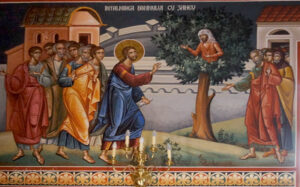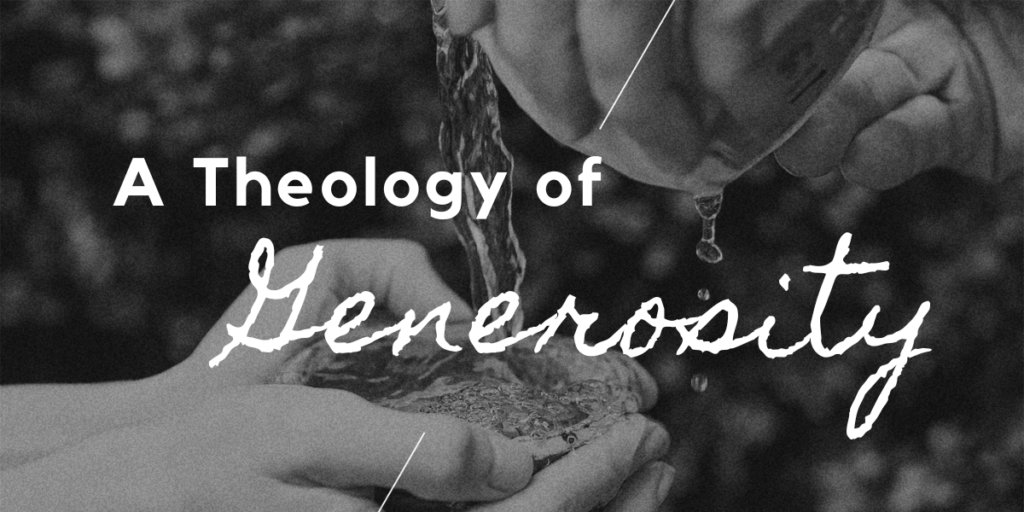
Generosity, the Gospel, and God’s People
A Theology of Generosity: Part 1
Have you realized that the Apostle Paul only quotes Jesus twice in his epistles? [*] When I first learned this, I was shocked. Even though I had read his epistles at least a dozen times, I had not picked up on the lack of direct quotes from Jesus. Rather than focusing on why Paul quoted Jesus so little, I wanted to know what the two quotes were. Surely, for Paul to quote so little, the two teachings must be essential.
The first comes from 1 Corinthians 11.23-25. In this section, Paul teaches what he learned from Jesus about the Eucharist. If you look at the Gospels, you will see 1 Cor. 11.23-25 is a near-verbatim quotation of the Last Supper in Matthew, Mark, and Luke’s Gospels. Given the centrality of the Eucharist, it makes sense that Paul would repeat this story.
 The second time Paul quotes Jesus is in Acts 20.35b: “Remember the words of the Lord Jesus, how he himself said, ‘It is more blessed to give than to receive.’” Interestingly, the Gospels do not record Jesus ever saying this. Perhaps Jesus himself taught this to Paul at some point. Unlike the Eucharist, however, I would not have guessed this would have been the second quote.
The second time Paul quotes Jesus is in Acts 20.35b: “Remember the words of the Lord Jesus, how he himself said, ‘It is more blessed to give than to receive.’” Interestingly, the Gospels do not record Jesus ever saying this. Perhaps Jesus himself taught this to Paul at some point. Unlike the Eucharist, however, I would not have guessed this would have been the second quote.
Think about that: the only two times Paul directly quotes Jesus feature his teachings on the Eucharist and on generosity. If we consider what Jesus himself had to say about generosity, we can see why this was important to Paul and should be important to us.
Jesus teaches in the Gospels that generosity is at the heart of God. As God is loving, kind, merciful, and just, He is also generous. When Jesus sat with the high official, Nicodemus, and shared his message of good news, he told Nicodemus, “God so loved the world, that He gave His only begotten Son.” Generosity and the Gospel are intricately entwined.
 This Sunday, we will read the story of Zacchaeus in Luke 19.1-10. We often think of Zacchaeus as a wee little man. In reality, despite being vertically challenged, he was the big man in Jericho. He was an extremely wealthy individual. His life centered on attaining wealth – even at the cost of others’ well-being. However, when Jesus met him, everything changed. I love how the story shows us that his heart, head, and hands were transformed. The same hands that once reached out with greed suddenly extended with generosity to the poor. Now, the mind which calculated exorbitant taxation now saw fit to pay back fourfold anyone he had defrauded. That is a shining example of how the Gospel and generosity are entwined.
This Sunday, we will read the story of Zacchaeus in Luke 19.1-10. We often think of Zacchaeus as a wee little man. In reality, despite being vertically challenged, he was the big man in Jericho. He was an extremely wealthy individual. His life centered on attaining wealth – even at the cost of others’ well-being. However, when Jesus met him, everything changed. I love how the story shows us that his heart, head, and hands were transformed. The same hands that once reached out with greed suddenly extended with generosity to the poor. Now, the mind which calculated exorbitant taxation now saw fit to pay back fourfold anyone he had defrauded. That is a shining example of how the Gospel and generosity are entwined.
If you have paid attention to Luke’s Gospel for the past few weeks, Jesus has had a lot to say about generosity and wealth. To summarize the past few Gospel readings, we could say that generosity is a sign of a regenerated, transformed soul. One of the effects of our maturing in the Gospel is that our fingers loosen their grasp on goods and our hearts yearn to give.
Generosity is not an obligation to give a tithe (10% of our income). That quickly turns into legalism. Generosity is much more than a tithe. Generosity is about living into the self-sacrificial life that Jesus modeled and gave to us. As Paul reminds us, “Though he was rich, yet for your sake, he became poor, so that you by his poverty might become rich” (2 Corinthians 8.9). If Jesus is in us, then increasingly, such an open-handed tendency will also be in us.
Jesus desires His church to be marked by a character of profound generosity. However, this does not mean to say he wants to impose another law upon us to which we must adhere. Instead, we are to find our character altered through our faith so that what we value is defined by the overflowing grace of Jesus, who gave everything for us. When our life is oriented around God’s kingdom, we long for the simplicity and generosity of life that Jesus modeled on earth. When such generosity is found, that is when we are able to bless as we have been blessed.
Fr. Chase
[*] To be fair, Jesus and Paul both quote Leviticus 19.13 which would make it technically 3 times.

